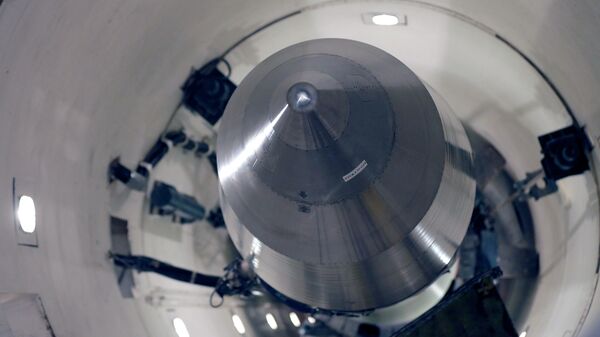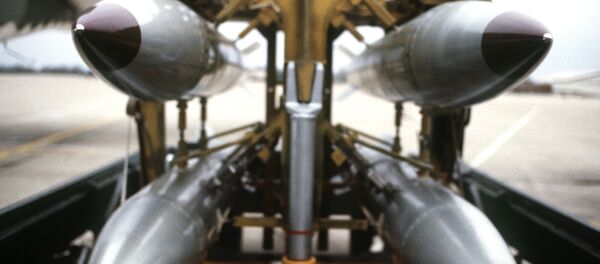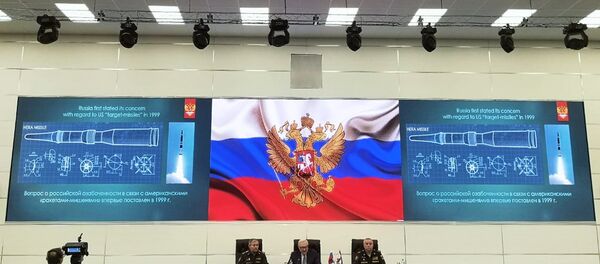Peter Kuznick is a professor of history at American University, where he founded the Nuclear Studies Institute. He has authored and co-authored numerous books, including The Untold History of the United States, Rethinking the Atomic Bombings of Hiroshima and Nagasaki: Japanese and American Perspectives and Nuclear Power and Hiroshima: The Truth Behind the Peaceful Use of Nuclear Power.
Professor Kuznick explains that Honduras' decision to join an ever increasing number of countries to agree to a ban on the development, use and threat of use of nuclear weapons is a significant symbolic act, in an era when arms controls treaties among major nuclear powers appear to be falling by the wayside.
Sputnik: What's the significance of Honduras being the latest country to join the UN's Treaty on the Prohibition of Nuclear Weapons?
Professor Peter Kuznick: What a remarkable and ironic development, especially after the US had been pressuring the previous 49 signers to withdraw their approvals. It is so fitting that Honduras, the original "banana republic," pushed it over the edge--a delicious f**k you to a century of US exploitation and bullying.
Sputnik: Is it possibly a bit of a distraction to focus on countries that have no nuclear capability?
Professor Peter Kuznick: Not really. This treaty represents the moral voice of humanity. It may not have a universal enforcement mechanism, but it clearly states that the people of this planet abhor the power-hungry, annihilation-threatening madness of the nine nuclear powers. The symbolic significance can not be overstated.

Sputnik: There already is a Treaty on Nuclear Non-Proliferation which came into force in 1970 and which nearly every country on the planet is a party to. Is the NPT being lived up to?
Professor Peter Kuznick: The NPT has been lived up to to a surprising extent by the non-nuclear powers. It is amazing that more countries have not gone the nuclear path. The world is fortunate that more haven't made that leap at a time when, according to [former head of the International Atomic Energy Agency Mohamed] El Baradei, at least 40 countries have the technological capability of doing so. The ones who are guilty of violating it are the five original signatories--the US, Russia, China, Britain, and France. They have completely ignored Article 6, which requires the nations possessing nuclear arsenals to reduce and eliminate those arsenals. The total number of nuclear weapons may have been cut from an absolutely insane 70,000 to a slightly less insane 13,500, but that is still enough to end life on the planet many times over.
Sputnik: What good will yet another treaty, such as the one Honduras just joined, be in such an environment?
Professor Peter Kuznick: The NPT didn't make possession, development, transportation, and threat to use nuclear weapons illegal. The new treaty does and explicitly so. This is a major symbolic leap. While it won't put the leaders of the nuclear weapons states on trial by the International Criminal Court, it will put pressure on them to heed global sentiment as has been the case with chemical weapons, land mines, and other treaties. If the US wasn't concerned about the effect of this pressure, why did it make such an effort to block the treaty's ratification? As [former US president Dwight D] Eisenhower and [former Secretary of State John Foster] Dulles both stated during the 1950s, it was the global nuclear taboo that stopped them from using nuclear weapons on several occasions. Global moral pressure can constrain bad actors and sometimes even force them to become good actors.
Sputnik: In 2002 the US administration of George W Bush Jr withdrew from the Anti-Ballistic Missile (ABM) Treaty. The Trump Administration withdrew from the Intermediate-Range Nuclear Forces (INF) Treaty in 2019, and there are questions as to whether the New START treaty will be renewed before it expires in 2021. Both the ABM and the INF treaties were signed between the US and Soviet Union to reduce the risk of nuclear war. Explain the consequences of US withdrawal from key nuclear controls treaties such as the ABM and the INF treaty.
Professor Peter Kuznick: The consequences of US withdrawal from the ABM Treaty were enormous. On the one hand, it allowed the US to continue with implementation of its still unproven and costly missile defence systems. On the other, it induced the Russians to begin research and development of their own countermeasures. As a result of those efforts, on March 1, 2018, in his State of the Nation address, [Russian President] Vladimir Putin announced that the Russians had now developed five new nuclear weapons, all of which can circumvent US missile defence systems. Hence, abrogation of the ABM Treaty gave the US a false sense of security and by putting Russia in a vulnerable position, it sparked Russian innovation that has put the US in a weakened position.
Sputnik: Why do you think the US has been moving away from these nuclear arms control treaties that it originally signed with the Soviet Union? Have they not been serving their purpose?
Professor Peter Kuznick: The Trump administration policymakers do not want to see the US constrained by international treaties. They believe the US can and will win an arms race. [US president Donald] Trump has said so repeatedly. In 2016, he declared, "Let it be an arms race. We will outmatch them at every pass and outlast them all." This past May, Trump's chief arms control negotiator, Marshall Billingslea, similarly stated, "We can spend Russia and China into oblivion in order to win a new nuclear arms race." They are both insane and should be taken away by the men in white coats. In 1986, during the previous arms race, before Gorbachev, with a little late help from Reagan, injected some sanity into the world, the nuclear powers had accumulated approximately 70,000 nuclear weapons, equivalent to some 1.5 million Hiroshima bombs. Do we really want to get back to that?
Sting sang a powerful song in the 1980s with the lyrics, "I hope the Russians love their children too." We were lucky that they did. I don't think Trump is capable of loving anyone other than himself and he has a straight line to the nuclear button with no one standing in his way.
Sputnik: What is the New START Treaty and how does it fit into all of this?
Professor Peter Kuznick: The New START Treaty limits the number of deployed strategic nuclear weapons to 1,550 and also limits the number of launch vehicles. Because of technicalities, the number of weapons is actually higher. It is all that is left of the nuclear arms control architecture that has taken decades to erect. It is all that stands in the way of nuclear anarchy and the new arms race I was just talking about. It is set to expire on February 5 [2021].
Sputnik: Where would you like to see policy makers go from here, in particular among major nuclear powers?
Professor Peter Kuznick:
- First, they need to extend the New START Treaty for five years, as Biden has promised he will do.
- Second, they need to reinstitute the JCPOA (Iran nuclear deal) and the INF Treaty.
- Third, they need to take all weapons off hair-trigger alert.
- Fourth, they need to get rid of all ICBMs, which are the most vulnerable part of the arsenal and require immediate launch if an incoming missile is detected as has happened numerous times only to be found to be false alarms.
- Fifth, they need to change command and control to insure that other responsible leaders have to sign off besides just the president before nuclear weapons are ever used.
- Sixth, they need to reduce arsenals below the threshold for nuclear winter.
- Seventh, they need to join the [UN's Treaty on the Prohibition of Nuclear Weapons] and abolish nuclear weapons entirely.
- Eighth, they need to take the money they've been wasting on weapons of annihilation and invest them in areas that will uplift humanity and improve people's lives.
I can give them lots of suggestions of where to begin if they want to listen.




